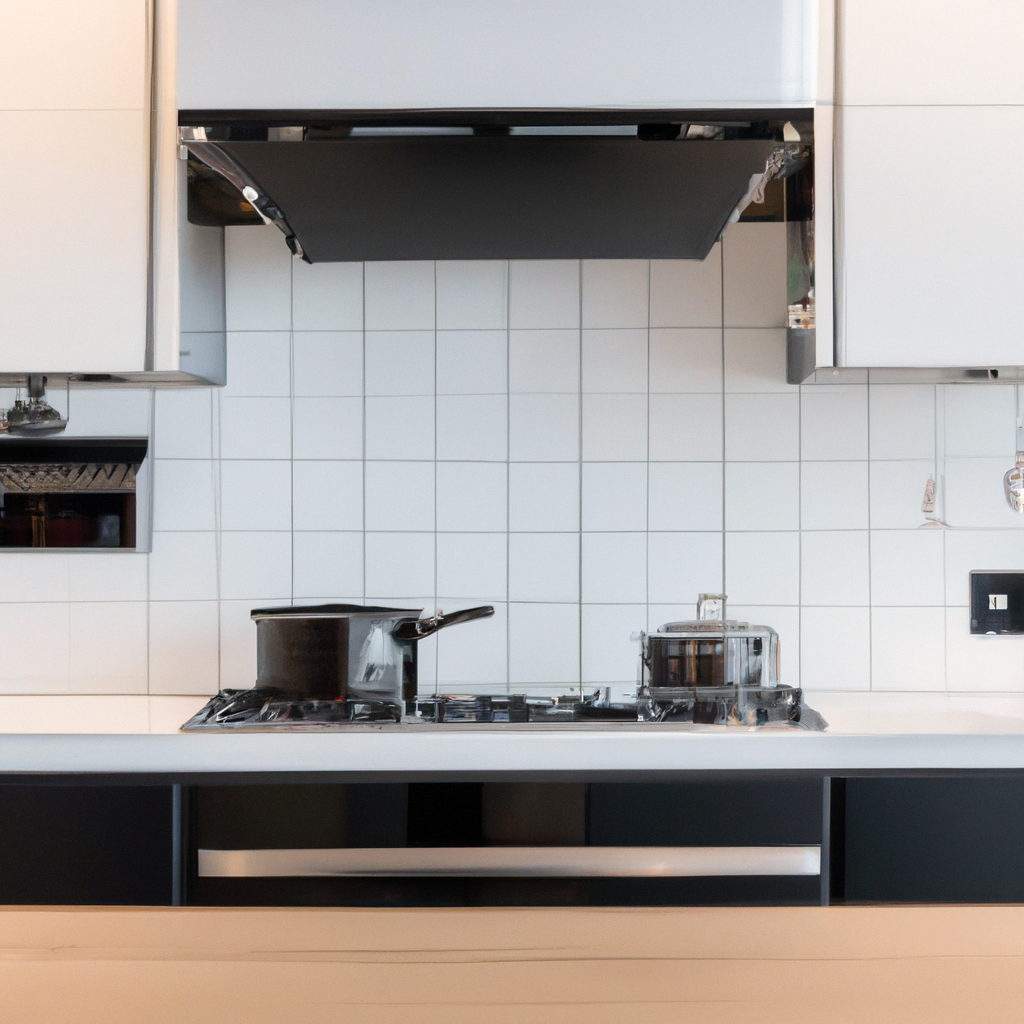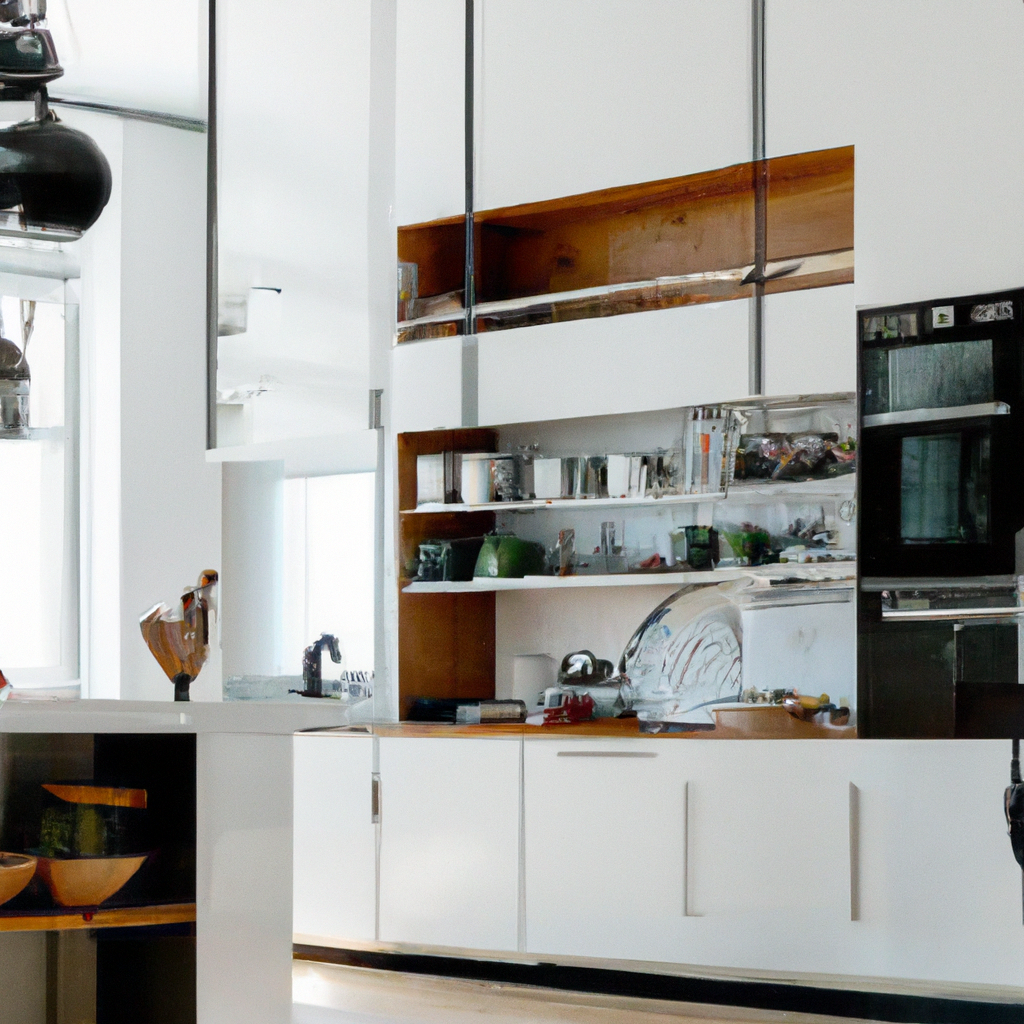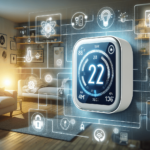Imagine a world where your kitchen knows exactly what you need before you even realize it. In the age of smart homes, this futuristic dream is becoming a reality. With the rapid advancement of technology, it is now possible to customize and automate tasks in your very own smart kitchen. From setting the perfect temperature for brewing your morning coffee to automatically preheating your oven for dinner, the possibilities are endless. In this article, we will explore the exciting world of smart kitchens and how you can make your everyday cooking experience more efficient and enjoyable.

Setting up a Smart Kitchen
Setting up a smart kitchen involves choosing the right smart appliances, connecting them to a smart hub, and ensuring the security of your smart kitchen.
Choosing the Right Smart Appliances
When it comes to setting up a smart kitchen, choosing the right smart appliances is key. Consider the functionality and features you desire in your kitchen appliances. From smart refrigerators to intelligent ovens and voice-controlled coffee machines, there is a wide range of options available in the market. Make sure to research and select appliances that align with your needs and preferences.
Connecting Appliances to a Smart Hub
Once you’ve chosen your desired smart appliances, the next step is to connect them to a smart hub. A smart hub acts as the central control unit for all your smart appliances, allowing you to manage and control them from a single device. There are various smart hub options available, ranging from standalone devices to systems integrated into smart speakers or home automation systems. Choose a smart hub that is compatible with your appliances and suits your requirements.
Securing your Smart Kitchen
When setting up a smart kitchen, it is important to prioritize security. As with any internet-connected devices, smart appliances are vulnerable to hacking or unauthorized access. To ensure the security of your smart kitchen, follow these best practices:
- Change default passwords: Most smart appliances come with default passwords, which are easily guessable. Make sure to change these default passwords to strong, unique ones.
- Update firmware regularly: Manufacturers release firmware updates that address security vulnerabilities. Keep your smart appliances up to date with the latest firmware to ensure maximum security.
- Enable two-factor authentication: Utilize two-factor authentication when available to add an extra layer of security to your smart appliances.
- Secure your network: Protect your Wi-Fi network with a strong password, enable network encryption, and consider using a separate network for your smart devices.
- Be cautious of third-party apps: Only download apps from trusted sources and be aware of the permissions you grant to these apps.
Customizing Smart Kitchen Tasks
With a smart kitchen, you have the ability to customize your cooking profiles, set preferences, and receive personalized recipe suggestions.
Creating Personalized Cooking Profiles
One of the advantages of a smart kitchen is the ability to create personalized cooking profiles. By setting up individual profiles for family members or frequent guests, you can tailor the kitchen experience to their specific needs. You can customize preferences such as preferred cooking methods, ingredient restrictions, and even dietary goals. This ensures that every meal is personalized to each individual’s taste and dietary requirements.
Setting Preferences for Temperature and Cook Timings
Another way to customize your smart kitchen experience is by setting preferences for temperature and cook timings. With a simple touch or voice command, you can define your preferred temperature settings for cooking various dishes. This not only saves you time but also ensures that your meals are cooked to perfection every time. Additionally, you have the flexibility to adjust cook timings according to your schedule or desired level of doneness.
Customizing Recipe Suggestions
Smart appliances in your kitchen can analyze your cooking habits and offer personalized recipe suggestions. By analyzing your preferences and previous cooking patterns, these appliances can recommend recipes that match your taste and dietary preferences. This eliminates the hassle of searching for recipes and allows you to discover new dishes based on your personal preferences.
Automating Kitchen Tasks
Automation is a key feature of a smart kitchen, allowing you to control appliances with voice commands, schedule tasks, and even automate grocery shopping.
Using Voice Commands to Control Appliances
One of the most convenient aspects of a smart kitchen is the ability to control appliances through voice commands. Whether it’s preheating the oven, brewing coffee, or setting the timer, you can simply speak to your smart assistant and let it handle the task for you. This hands-free operation enhances convenience and efficiency in the kitchen, allowing you to multitask and save time.
Scheduling Tasks with Smart Apps
With the help of smart apps, you can schedule various kitchen tasks in advance. From setting the oven to start preheating before you arrive home to delaying the start of the slow cooker while you’re at work, these apps allow you to automate your cooking process. You can even schedule reminders for grocery shopping or meal planning, ensuring that you never miss an important task in your kitchen routine.
Automating Grocery Shopping
Gone are the days of manually creating grocery lists. With a smart kitchen, you can automate your grocery shopping process. Some smart refrigerators or pantry management systems are equipped with sensors that can detect when certain items are running low. They can then automatically add those items to your digital shopping list or even place an order for you. This feature saves you time and ensures you never run out of essential ingredients.
Integrating Smart Kitchen with Other Smart Devices
A smart kitchen can be seamlessly integrated with other smart devices in your home, such as smart lighting systems, smart speakers, and home security systems.
Syncing Kitchen with Smart Lighting Systems
Integrating your smart kitchen with smart lighting systems allows you to create the perfect ambiance while cooking. You can control the brightness and color of your kitchen lights to suit your mood or task at hand. For example, you could dim the lights for a relaxing evening meal or set them to a brighter, cooler hue for better visibility while preparing meals. Smart lighting systems can be synchronized with other smart appliances, creating a harmonious and personalized cooking environment.
Interacting with Smart Speakers
Smart speakers play a vital role in a smart kitchen setup. With voice assistants like Amazon Alexa or Google Assistant, you can control your smart appliances, get recipe suggestions, and even listen to music or podcasts while cooking. Smart speakers can also provide real-time information on weather updates, unit conversions, or even answer cooking-related questions. They act as a helpful companion, making your cooking experience more enjoyable and efficient.
Connecting Smart Kitchen to Home Security Systems
Integrating your smart kitchen with your home security system adds an extra layer of convenience and peace of mind. With smart security cameras installed in your kitchen, you can remotely monitor your cooking progress or check on your appliances while you’re away. Additionally, smart smoke and gas detectors can send alerts to your smartphone in case of any potential hazards. This integration ensures the safety of your kitchen and allows you to respond quickly to any emergencies.

Enhancing Efficiency in the Smart Kitchen
A smart kitchen offers various features and functionalities that enhance efficiency, including tracking food inventory, optimizing energy consumption, and monitoring cooking progress remotely.
Tracking and Analyzing Food Inventory
Smart refrigerators or pantry management systems come equipped with sensors that can track and analyze your food inventory. This feature helps you keep track of what ingredients you have, their expiration dates, and even suggest recipes based on the available ingredients. By minimizing food waste and maximizing ingredient utilization, you can save money and reduce your environmental impact.
Optimizing Energy Consumption
Smart appliances are designed to optimize energy consumption, helping you reduce your electricity bills and contribute to a greener environment. For example, smart refrigerators use advanced technology to regulate temperature and humidity levels, ensuring that they run efficiently and minimize energy waste. Additionally, some smart ovens have features like rapid preheating or energy-saving modes that help you cook efficiently while saving energy.
Monitoring Cooking Progress Remotely
With a smart kitchen, you don’t have to be physically present in the kitchen to monitor your cooking progress. Smart appliances allow you to remotely monitor the cooking process through your smartphone or smart assistant. You can check the status of your oven, adjust temperature settings, or even receive notifications when your meal is ready. This feature gives you the flexibility to attend to other tasks or spend time with your family while still ensuring a perfectly cooked meal.
Ensuring Safety in the Smart Kitchen
Safety is a top priority in any kitchen, and a smart kitchen offers enhanced safety features such as sensors for smoke and gas detection, automatic shut-off functionality, and remote monitoring with alerts.
Sensors for Smoke and Gas Detection
Smart kitchen appliances are equipped with sensors that detect smoke and gas leaks. In case of smoke or excessive gas levels, the sensors trigger an alarm or send an alert to your smartphone, ensuring that you are immediately notified of any potential dangers. This early warning system helps prevent accidents and allows you to take appropriate action to keep your kitchen, and your home, safe.
Automatic Shut-off Functionality
Many smart appliances have automatic shut-off functionality built-in. This feature can be programmed to turn off the appliances after a certain period of inactivity or when certain conditions are met. For example, a smart stove can automatically turn off if left unattended for an extended period. This prevents accidents caused by forgetfulness and provides added peace of mind, especially if you have children or pets in the house.
Remote Monitoring and Alerts
With a smart kitchen, you can remotely monitor your appliances and receive alerts for various events. Whether it’s receiving a notification when your oven reaches the desired temperature or being alerted if your refrigerator door is left open, remote monitoring keeps you informed and ensures that you can take immediate action when required. This feature gives you peace of mind, knowing that you can always stay connected to your kitchen regardless of your location.

Privacy and Data Security
As with any technology that collects data, it is important to be aware of data collection and usage, implement strong security measures, and choose reliable and trustworthy brands.
Understanding Data Collection and Usage
Smart appliances in the kitchen may collect data on your usage patterns, preferences, and even your cooking habits. This data is used to improve the functionality and performance of the appliances, provide personalized suggestions, or for marketing purposes. It is important to understand the data collection and usage policies of the manufacturers and ensure you are comfortable with how your data is being handled.
Implementing Strong Security Measures
To ensure the privacy and security of your smart kitchen, it is crucial to implement strong security measures. This includes changing default passwords, regularly updating firmware, enabling two-factor authentication, and securing your Wi-Fi network. Additionally, be cautious of the third-party apps you use and the permissions you grant them. By taking these precautions, you can minimize the risk of unauthorized access to your smart appliances and protect your personal information.
Choosing Reliable and Trustworthy Brands
When setting up a smart kitchen, it is important to choose appliances from reliable and trustworthy brands. Established brands often have a reputation for prioritizing customer security and privacy. Research the manufacturer’s track record, read customer reviews, and look for certifications or security features offered by the appliance. Investing in trusted brands reduces the risk of security breaches and ensures a higher level of data protection.
Benefits of a Smart Kitchen
A smart kitchen offers numerous benefits, including time-saving and convenience, healthier cooking, personalized nutrition, and reducing food waste and energy consumption.
Time-saving and Convenience
With a smart kitchen, tasks that would typically require manual effort and constant monitoring can be automated, saving you time and effort. From preheating your oven before you even step foot in the kitchen to automatically brewing your coffee as soon as your alarm goes off, a smart kitchen streamlines your cooking process and makes everyday tasks more convenient.
Healthier Cooking and Personalized Nutrition
With the ability to create personalized cooking profiles and receive recipe suggestions based on your preferences, a smart kitchen promotes healthier cooking and personalized nutrition. You can easily accommodate dietary restrictions, track nutritional information, and discover new recipes that align with your health goals. By customizing your cooking experience, you can prioritize nutrition and make more informed choices for yourself and your family.
Reducing Food Waste and Energy Consumption
By tracking and analyzing your food inventory, a smart kitchen helps minimize food waste. With real-time information on ingredient levels and expiration dates, you can plan your meals more effectively, reduce overbuying, and make use of available ingredients before they spoil. Additionally, smart appliances optimize energy consumption, reducing your electricity bills and contributing to a more sustainable lifestyle.

Challenges of a Smart Kitchen
While smart kitchens offer numerous benefits, they also present some challenges, including the initial investment and cost, compatibility issues with older appliances, and technical glitches and dependence on the internet.
Initial Investment and Cost
Setting up a smart kitchen can involve a significant initial investment. Smart appliances generally come with a higher price tag compared to traditional appliances. However, it is important to consider the long-term cost savings, improved efficiency, and convenience that smart appliances offer. With advancements in technology and increased market competition, the cost of smart kitchen appliances is gradually becoming more affordable.
Compatibility Issues with Older Appliances
If you already have existing appliances in your kitchen, compatibility with smart devices may be a concern. Older appliances may not be equipped with the necessary technology to connect to a smart hub or participate in automation. In such cases, you may need to replace or upgrade your appliances to fully enjoy the benefits of a smart kitchen. However, it is worth noting that not all appliances need to be smart-enabled, and you can gradually transition to a smart kitchen by focusing on the appliances you use most frequently.
Technical Glitches and Dependence on Internet
Like any technology, smart appliances are not immune to technical glitches or temporary malfunctions. From intermittent connectivity issues to software bugs, occasional technical difficulties can occur. Additionally, a smart kitchen relies heavily on internet connectivity, and any disruptions to your internet service can impact the functionality of your appliances. However, with continuous advancements in technology and reliable internet connections becoming more commonplace, these challenges are being mitigated.
Future of Smart Kitchens
The future of smart kitchens holds exciting prospects, with advancements in artificial intelligence and machine learning, the creation of comprehensive smart kitchen ecosystems, and integration with smart grids.
Artificial Intelligence and Machine Learning
Artificial intelligence and machine learning are revolutionizing the capabilities of smart kitchens. By analyzing data from various sensors and user behaviors, smart appliances can learn your preferences, adapt to your cooking style, and provide more accurate recommendations. This opens up possibilities for personalized cooking experiences, customized meal planning, and even automated cooking processes that adjust based on real-time conditions.
Smart Kitchen Ecosystems
As the concept of a smart home gains popularity, the development of comprehensive smart kitchen ecosystems is on the horizon. Integration between appliances, smart assistants, and other smart devices will become more seamless, offering a cohesive and intuitive user experience. Imagine a smart kitchen where your oven coordinates with your smart fridge and pantry, automatically suggesting recipes based on available ingredients and updating your shopping list accordingly.
Integration with Smart Grids
In the near future, smart kitchens are expected to integrate with smart grids, bringing additional benefits for both consumers and the environment. By syncing with electricity grids, smart appliances can take advantage of off-peak hours to optimize energy consumption and reduce costs. They can also participate in demand response programs, where appliances adjust their energy usage based on real-time electricity demand, contributing to a more sustainable energy grid.
In conclusion, setting up a smart kitchen offers a host of benefits, including customization and automation of tasks, enhanced efficiency, improved safety, and greater control over your cooking experience. While there are challenges to consider, such as initial investment and compatibility issues, the future of smart kitchens holds exciting potential through advancements in artificial intelligence, smart ecosystems, and integration with smart grids. With the right choices and considerations, you can enjoy the convenience, time-saving, and improved cooking experience that a smart kitchen brings.











